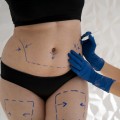When it comes to cosmetic surgery, there are a variety of procedures that can help enhance one's appearance. From breast augmentation to liposuction, nose reshaping to eyelid surgery, tummy tucks to facelifts, the options are endless. However, it's important to note that not all plastic surgeons are created equal. In fact, they are divided according to their area of expertise, with some specializing in facial procedures, others in implants, and others in body contouring.
This is why it's crucial to carefully and wisely choose the best plastic surgeon for your cosmetic surgery. For facial procedures such as rhinoplasty, facelift surgery, and blepharoplasty, there are specialized surgeons who have extensive experience and training in these specific areas. Rhinoplasty, also known as nasal reshaping, helps create a balance between facial features and can greatly enhance one's appearance. On the other hand, there are surgeons who specialize in body contouring procedures such as tummy tucks, liposuction, and post-bariatric body lifts. These procedures involve removing excess skin and fat from the abdomen to tighten loose muscles and create a smooth, flat surface. The training and experience required to become a board-certified cosmetic surgeon goes beyond what is needed for board certification in a related discipline like plastic surgery.
While plastic surgery residency programs may include cosmetic surgery as part of a surgeon's training, they typically do not cover all cosmetic procedures. This is because plastic surgery is intended to correct dysfunctional areas of the body and is considered reconstructive in nature. In fact, in 1999, the American Society of Plastic and Reconstructive Surgeons changed its name to the American Society of Plastic Surgeons to better communicate the message that plastic and reconstructive surgeons are one and the same. Plastic surgery is defined as a surgical specialty dedicated to the reconstruction of facial and body defects caused by congenital disorders, trauma, burns, and diseases. On the other hand, cosmetic surgery is focused on improving the patient's appearance.
As such, the training and certification process for a board-certified cosmetic surgeon will differ greatly from that of a board-certified plastic surgeon. Many women turn to plastic surgery procedures such as breast augmentation, rhinoplasty, and liposuction to transform their appearance and feel more confident. While both cosmetic surgery and plastic surgery aim to improve one's body, their philosophies and goals for patient outcomes are different. This is why the title "board-certified plastic surgeon" indicates a certain level of training and experience in plastic surgery, but not necessarily in cosmetic surgery. The residency training required to become certified in plastic surgery may not include training on many common aesthetic procedures. If you've always thought that cosmetic surgery and plastic surgery were the same thing, you're not alone.
According to the American Society of Plastic Surgeons, some of the most common aesthetic procedures (both invasive and minimally invasive) include breast augmentation, rhinoplasty, liposuction, facelifts, and eyelid surgery. These procedures are performed by doctors from various fields of medicine, including plastic surgeons who specialize in implants such as breast implants, facial implants for the lip, chin, and cheeks, as well as buttock implants and calf implants that help improve and define a woman's physique.




Leave Reply